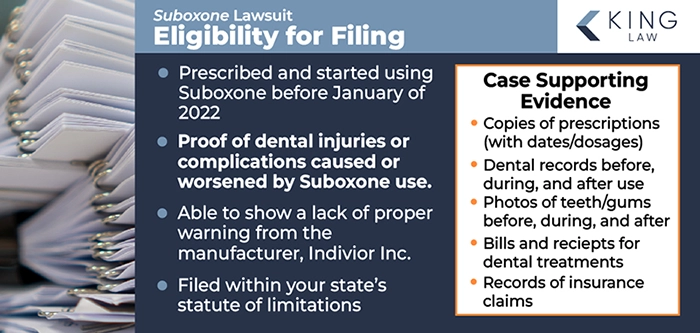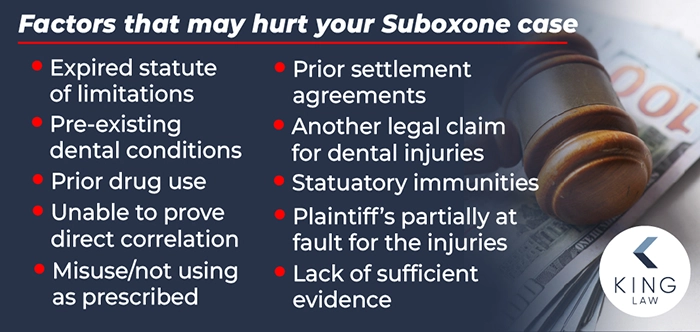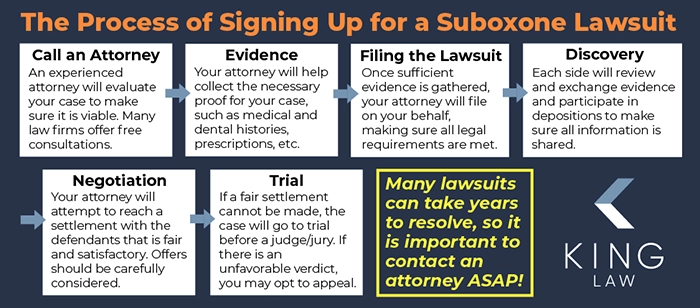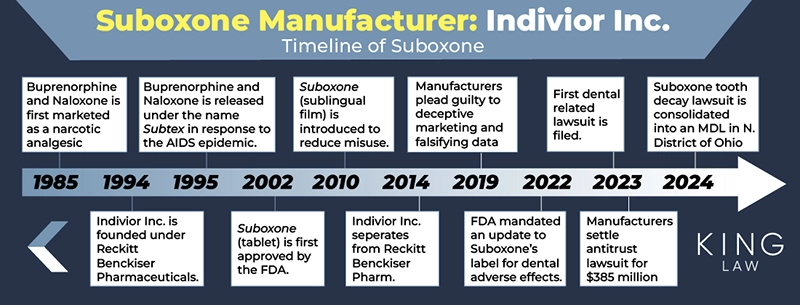
If you were prescribed Suboxone sublingual films on or before January 2022 and experienced dental injuries, you may still be eligible to join a lawsuit against the drug’s manufacturer, Indivior. Individuals who experienced tooth decay, caries, cavities, gum disease, tooth loss, or other severe dental problems after taking Suboxone sublingual strips may be entitled to compensation.
If you experienced dental injuries after taking Suboxone, you should act quickly to ensure all legal requirements are met, including the state-specific statute of limitations. A lawyer can help you determine eligibility and navigate the legal process. If you believe you meet the criteria to file a Suboxone lawsuit, contact King Law for a free consultation.
How to Join the Suboxone Lawsuit:
How to Join the Suboxone Lawsuit in 2024
Who is Eligible to File a Suboxone Lawsuit?
What is the Process to Sign Up for a Suboxone Lawsuit?
How Long Will Filing a Suboxone Claim Take?
Evidence Needed to Join the Suboxone Lawsuit
Why Are People Filing Tooth Decay Lawsuits for Suboxone?
About the Suboxone Manufacturer: Indivior, Inc.
Allegations Against Indivior, Inc. in the Suboxone Lawsuit
What Damages Can You Claim in a Suboxone Lawsuit?
Deadline for Joining the Suboxone Lawsuit
Reaching a Settlement in a Suboxone Lawsuit
Average Payouts Per Person in the Suboxone Lawsuit
Suboxone Lawsuit and Settlement Claim Form
How to Join the Suboxone Lawsuit in 2024
Individuals who have suffered severe dental problems such as tooth decay, tooth loss, cavities, caries, or gum disease after using Suboxone films may be able to file a lawsuit against the manufacturer Indivior, Inc. To join a suboxone lawsuit, you should work with an experienced law firm. A reputable attorney can help you through each step of the process. Here are the initial steps to take to file a Suboxone lawsuit.
Follow these 4 steps to join the Suboxone lawsuit:
- Gather evidence of your Suboxone subscription and your injuries, including receipts, dental/medical records, photographs, or any relevant information.
- Contact a reputable lawyer who is experienced in Suboxone and pharmaceutical cases.
- Discuss your history and injuries with a lawyer during your free consultation.
- Work with your lawyer to determine if you are eligible to file a case due.
After the initial steps are completed, your attorney will determine your eligibility. If you are eligible to file a Suboxone lawsuit, you will need to take these steps:
- Gather Trial Evidence: Prior to filing a lawsuit, individuals who have suffered dental injuries related to Suboxone use should collect medical records, prescriptions, and photographs that indicate when they started using the drug and for how long, as well as dental records documenting injuries and treatments. This documentation will help you prove your claim.
- File a Claim: Once an attorney determines that you meet the eligibility requirements and the necessary documents are collected, you can file a claim. Your lawyer will draft a legal complaint detailing the allegations against the manufacturer of Suboxone, Indivior. They will then file the complaint in the appropriate court. Your case may be placed in multidistrict litigation.
- Enter Discovery Phase and Negotiations: Once the case is filed, it will go through the Discovery phase, during which both sides will exchange information and may participate in depositions. Your lawyer will also enter into negotiations to secure a fair and favorable settlement on your behalf.
- Prepare for Your Trial: If a favorable settlement cannot be reached, the matter be set for trial. Your lawyer will present the case in front of a judge/jury. If the verdict is for the defendant, you may have the opportunity to appeal.
It is important to stay informed and involved throughout your case in order to receive your potential payout. During the legal process, you should maintain contact with your lawyer for updates on your claim. Your lawyer will provide you with advice to strengthen your case.
Who is Eligible to File a Suboxone Lawsuit?
Anyone who experienced tooth decay and dental injuries after taking Suboxone may be eligible to file a lawsuit. However, your injuries must have occurred within a certain timeframe. An attorney can help you determine if you meet the requirements and should take legal action.
To file a lawsuit, you must have received a valid Suboxone prescription prior to June 2022, when the label was updated by the U.S. Food and Drug Administration (FDA). You also must have started taking the drug prior to January 2022, when the FDA issued a warning about the potential for dental injuries from Suboxone use. Your lawyer will work with you to confirm you meet these criteria for filing a lawsuit.
Eligibility criteria for filing a Suboxone tooth decay lawsuit:
- Suboxone use: Started using Suboxone before January 2022, when the FDA issued a warning about potential dental risks associated with the use of the drug.
- Suboxone prescription: Received a Suboxone prescription prior to June 2022, when the FDA mandated a safety label update.
- Dental injury: Experienced worsening dental health, tooth erosion, or severe dental injuries.
- Dental complications: Have proof of dental complications related to Suboxone use, including dental caries, root canals, tooth extractions, oral infections, and cracked teeth.
- Proof of injury: Experienced an injury and can collect paperwork from doctor and dental appointments, surgeries, procedures, and associated billings that may help to establish a correlation between Suboxone use and your dental problems.
- Indivior’s lack of warning: Be able to show that you were not warned about the risk of dental injuries while taking prescription Suboxone sublingual film. Individuals who began taking the drug after June 2022 are generally not eligible since patients were made aware of potential issues by an FDA-mandated label update.
- Statutory requirements: File within the state’s statute of limitations for product liability cases. Statutes generally begin on the injury or diagnosis date.
It is important to note that Suboxone lawsuits are complex cases, particularly when dental issues predated Suboxone use but were made worse by taking the drug. Consultation with an experienced lawyer is strongly recommended to ensure all eligibility requirements are met.

Disqualifying Factors for Suboxone Lawsuit Eligibility
Unfortunately, not all Suboxone patients who experience dental problems will be eligible for compensation. Some disqualifying factors include not filing a lawsuit quickly enough, pre-existing conditions, inability to prove a connection between Suboxone and dental problems, and non-compliance with prescription guidelines. An attorney will work with you to determine if these factors will keep you from a successful lawsuit.
Disqualifying factors for a Suboxone lawsuit:
- Statute of limitations: If the statute of limitations has expired, meaning that too much time has passed since the injury or its discovery, you may be barred from obtaining compensation. The deadline for filing a lawsuit varies by state and should be discussed with a qualified attorney.
- Pre-existing conditions: If you have existing dental issues not caused by Suboxone, it may weaken or disqualify your case.
- Prior drug use: If you used methamphetamine or other drugs that caused dental injuries or tooth decay similar to those suffered by Suboxone patients, your claim may be disqualified.
- Lack of causation: If you are unable to prove that your dental issues were directly caused by Suboxone use, your claim may be denied.
- Non-compliance with prescription guidelines: Not using Suboxone as prescribed may disqualify a patient from being able to file a lawsuit.
- Prior settlement agreements: Previous settlements related to Suboxone use may bar further lawsuits.
- Another legal claim: Eligibility may be affected for individuals who pursue other legal claims against different drug manufacturers for the same injuries.
- Lack of evidence: Insufficient medical records and documentation may negatively impact your claim.
- Statutory immunities: Certain statutory protections may limit the ability to sue manufacturers or healthcare providers.
- Comparative negligence: Plaintiff’s partial fault for their injuries may reduce or negate the ability to recover damages.

What is the Process to Sign Up for a Suboxone Lawsuit?
There are several steps to filing a successful Suboxone lawsuit. Here is the general process:
- Contact an experienced attorney and enlist their services.
- Work with your attorney to determine your eligibility.
- Collect evidence to support your claim.
- File a claim, with support from your attorney.
- Participate in the Discovery phase.
- Negotiate a settlement or prepare for trial.
- Receive payment upon a successful settlement or trial outcome.
Individuals who have suffered dental problems after taking the medication are strongly encouraged to contact an attorney. An experienced attorney can help determine the validity of your claim. Once eligibility is confirmed, your attorney may help you collect the evidence necessary to substantiate your claim. Key documentation will likely include dental records, prescription history, and medical evaluations.
With the necessary evidence gathered, your attorney may then file a claim. An experienced lawyer will ensure that all legal requirements are met, including that your case is filed within the state-specific statute of limitations. After your case is filed, it may enter into the Discovery phase. During Discovery, each side may review the evidence and engage in depositions to ensure the necessary information is shared between the parties. The attorneys for each side may also enter into negotiations to reach a fair settlement in the case.
If a fair settlement cannot be reached, the case may move to trial. During the trial, the case will be presented in front of a judge/jury. If the verdict is unfavorable, your attorney may be able to appeal the decision. It is important to work closely with your attorney throughout the process to ensure you receive the most favorable outcome possible based on the circumstances of your case.

How Long Will Filing a Suboxone Claim Take?
While there is no set timeline for a Suboxone lawsuit, claims may take several weeks to a year or more to resolve. Taking the necessary time and proper steps will ensure you get the most favorable compensation possible.
It is important to act quickly, as the statute of limitations may limit the amount of time you have to file a claim. You should contact an attorney as soon as you suspect your dental injuries are related to your use of Suboxone films. The amount of time it takes to collect evidence and file a claim may take several weeks. Once the case is filed, the Discovery phase and negotiation process may take several months or more. If a fair settlement cannot be reached, a trial may take a week or more to complete before a verdict is rendered. Your legal team can help determine how long it may take to complete your case and receive a settlement.
Example Suboxone Tooth Decay Lawsuits Filed Against Indivior
Many people who experienced dental issues after taking Suboxone have filed lawsuits against the drug’s manufacturer, Indivior. These people are working toward compensation by filing lawsuits. Here are some examples of those lawsuits:
- King v. Indivior, Inc., et al. 1:23-cv-01924: A man from Geauga County, Ohio, filed suit against Indivior alleging his 16-month use of Suboxone resulted in severe tooth decay and eventually the loss of several teeth.
- Sorensen v. Indivior, Inc., et al. 1:23−01855: David Sorenson, a man from Ohio, filed a lawsuit against Indivior alleging that the high acidic content of the medication caused permanent tooth decay resulting in extensive dental repair.
- Delcastillo v. Indivior, Inc., et al. 2:24-cv-01111: Vincent Delcastillo, a New York man, filed a lawsuit against Indivior alleging his use of Suboxone caused damage to his teeth and gastroenterology issues.
Evidence Needed to Join the Suboxone Lawsuit
People who file successful Suboxone lawsuits require evidence to support their claims. Evidence may include medical records, photographs, patient and expert testimony, regulatory warnings, research, and other documents. It is essential to work with an experienced lawyer who can determine what evidence may be necessary to prove your claim and get you the highest payout possible.
To join a Suboxone tooth decay lawsuit, you and your attorney will need to present evidence to support your claim.
Evidence necessary for filing a Suboxone tooth-decay lawsuit:
- Medical records to support your injuries
- Personal medical history to establish your treatments and dental decline
- Expert and patient testimony about your injuries and how Suboxone caused them
- Insurance, financial, and communications records from you, your insurance company, and your healthcare team
- Photographic evidence to properly document your dental injuries
- Product packaging, FDA communications, and medical studies to substantiate your claim
Your attorney will work with you to collect this evidence and documentation. Examples of each type of evidence are as follows:
- Copies of Your Subscriptions: You will need to gather copies of all Suboxone prescriptions, including dates, dosages, and prescribing doctor’s information.
- Medical Records: Detailed dental records showing the onset and progression of dental issues, treatments received, dental health prior to Suboxone use, and reports from medical and dental professionals diagnosing the conditions and linking them to Suboxone use may all be necessary to prove your case.
- Personal Medical History: Records of any pre-existing dental or medical conditions before starting Suboxone and a treatment timeline of when Suboxone was prescribed and when dental issues began to manifest can help support your claim. Any records of healthy check-ups prior to Suboxone use will be helpful.
- Expert Testimony: Expert testimony from healthcare providers and dental specialists who can explain the link between Suboxone use and dental issues, as well as insights from experts on how Suboxone’s chemical composition can lead to dental health problems may be needed.
- Photographic Evidence: To assess the severity of the injury, clear photographs of the teeth and gums documenting the worsening of dental conditions over time may be needed. Dental x-rays or imaging prior to taking Suboxone will be helpful for your case.
- Patient Testimony: A detailed personal statement describing the experience with Suboxone, including adherence to prescribed usage, the onset of symptoms, and the impact on daily life will be needed. Additionally, descriptions of physical pain, emotional distress, and how dental issues have affected the overall quality of life can help determine damages.
- Financial Records: Invoices and receipts for dental treatments, medications, and any other related healthcare costs, as well as documentation of any work missed, pay stubs, and income lost due to dental health problems and related treatments will be needed. Bills and receipts for dental treatments, medications, and other related healthcare expenses will also be helpful.
- Communication Records: Emails, messages, and notes from discussions with doctors, dentists, and other healthcare professionals about Suboxone and its side effects and any communications with Indivior, Inc. or healthcare providers regarding Suboxone, including side effect reports and responses can help substantiate your claim.
- Insurance Records: Records of insurance claims related to dental treatments and any denials of coverage for these treatments and information on the insurance policy, coverage limits, and any relevant clauses may be necessary in your case.
- Regulatory and Warning Information: Any reports or warnings from the FDA or other regulatory bodies regarding Suboxone and its potential side effects and copies of Suboxone packaging, labels, and patient information leaflets are generally helpful.
Specific Evidence to Collect for Your Suboxone Case
An attorney can review the specific evidence that may be helpful to collect in your Suboxone lawsuit. Each lawsuit is unique, and your attorney will advise you on the specifics of your case. In general, the more documentation you have, the stronger your claim will likely be. It is imperative to create detailed records of your Suboxone use and dental injuries. Your attorney will work with you to collect the needed evidence.
Why Are People Filing Tooth Decay Lawsuits for Suboxone?
Thousands of people who took Suboxone sublingual films have reported substantial dental side effects and health effects. These effects have negatively impacted people emotionally and physically. Suboxone was on the market for about 20 years before the FDA and Indivior warned patients about these specific harms.
In 2022, the
One such study, “
Dental side effects and health risks reported by Suboxone users:
- Tooth Decay: Suboxone use has been linked to an increased risk of tooth decay due to acidity, dry mouth, and reduced saliva production. Symptoms that you may be suffering from tooth decay include visible holes or dark spots on teeth, tooth sensitivity, pain when eating or drinking, and bad breath.
- Cavities: Suboxone users have reported an increased frequency of cavities due to dry mouth and acidic environment caused by the drug. Cavity symptoms include persistent toothache, pain when eating sweets or consuming hot/cold beverages, visible pits or holes in teeth, and tooth staining.
- Gum Disease: Research and litigation indicate that Suboxone may lead to gum disease (gingivitis or periodontitis) through reduced saliva flow and increased bacterial growth. Symptoms of gum disease include swollen, red, or bleeding gums, bad breath, receding gums, and loose teeth.
- Tooth Loss: Suboxone use can lead to severe tooth decay and untreated gum disease can result in tooth loss, which is accelerated by Suboxone’s impact on oral health. Symptoms include missing teeth, shifting teeth, difficulty chewing, and changes in bite alignment.
- Oral Infections: Suboxone use may increase the risk of oral infections, such as thrush (oral candidiasis), due to its immune-suppressing effects and poor oral hygiene. Symptoms of an infection may include white patches on the tongue or inside the cheeks, redness or soreness, difficulty swallowing, and cracked skin at mouth corners.
- Dry Mouth (Xerostomia): A common side effect of Suboxone that causes reduced saliva production, which is crucial for neutralizing acids and washing away food particles. Symptoms include persistent dryness in the mouth, difficulty swallowing or speaking, sore throat, and a burning sensation in the mouth.
- Other Dental Issues: Prolonged exposure to buprenorphine (the active ingredient in Suboxone) can increase the risk of severe tooth decay, weaken tooth enamel, and cause other dental injuries. Common treatments include tooth extraction or removal.
- Additional Oral Side Effects: Additional oral side effects caused by Suboxone may include a painful tongue, mouth numbness, and swollen tongue.
About the Suboxone Manufacturer: Indivior, Inc.
Indivior, Inc., the manufacturer of Suboxone, was formed as a separate entity in 2014 as a spin-off of Reckitt Benckiser Pharmaceuticals. Indivior specializes in addiction treatment, particularly opioid dependence. Its flagship product was Suboxone, which received FDA approval in October 2002. The drug was originally available as sublingual tablets (2 mg and 8 mg) but transitioned to sublingual films in 2010 to reduce misuse and improve administration. It is alleged, however, that this transition may have been a strategy to extend patent protection and delay generic competition.
Suboxone contains buprenorphine (partial opioid agonist) and naloxone (opioid antagonist). It is known for its ability to help reduce withdrawal symptoms and cravings. Naloxone deters misuse by causing withdrawal if injected. Buprenorphine has been marketed in the U.S. since 1985, when it was listed as a Schedule V narcotic analgesic. In 1995, it was released as Subtex in response to the AIDS epidemic and marketed as having decreased respiratory action compared to full opiate agonists.
Indivior has faced substantial legal problems related to Suboxone, including multiple lawsuits for deceptive marketing practices. In 2019, the company was fined $1.4 billion after they allegedly falsely promoted the drug as being safer and less addictive than other opioids. The company also faced lawsuits for attempting to maintain a monopoly by switching from tablets to film and for causing the submission of false claims to federal healthcare programs.

Allegations Against Indivior, Inc. in the Suboxone Lawsuit
Allegations against Indivior, Inc., the manufacturer of Suboxone, include that the company failed to warn consumers and healthcare providers about the risk of severe dental problems linked to Suboxone, including tooth decay, cavities, gum disease, and tooth loss and that updates to the label of the medication (mandated in 2022 by the FDA) came too late.
Litigation against the company further alleges that Indivior knew or should have known about the risk of dental injury from scientific studies and adverse event reports but failed to act on the information. Additionally, lawsuits filed against Indivior accuse the company of manufacturing a product with a defective design, suggesting that the sublingual film contributes to dental problems due to prolonged exposure to its acidic nature, weakening tooth enamel.
The company has faced allegations that it aggressively marketed the drug without adequately addressing the dental risks in its materials and communications with healthcare providers. And that they caused direct harm to consumers since the use of Suboxone caused severe dental problems, resulting in significant pain, suffering, and financial costs for extensive dental treatments.
Prior accusations against Indivior include that the company falsely promoted Suboxone film as safer and less prone to abuse than similar drugs, misrepresented safety data to block generic competition, and engaged in schemes to maintain a monopoly over the market for Suboxone.
What Damages Can You Claim in a Suboxone Lawsuit?
Suboxone users who have been diagnosed with significant dental injuries related to the drug may have recoverable damages. It is important to work with an attorney to determine what damages may be applicable in your case.
Potential damages in a Suboxone lawsuit:
- Medical Expenses: Includes reimbursement for medical bills related to dental treatments caused by Suboxone (e.g., fillings, root canals, extractions) and compensation for anticipated future medical expenses to manage ongoing dental problems and long-term effects.
- Lost Wages: May encompass compensation for income lost due to time off work for medical treatments and recovery and damages for the loss of earning capacity due to long-term or permanent inability to work caused by dental issues.
- Pain and Suffering: Suboxone patients may receive compensation for physical pain and discomfort from dental issues and damages for emotional and psychological impacts, including anxiety, depression, and reduced quality of life.
- Loss of Consortium: If your injuries impacted your relationships, you may receive compensation for negative effects on those relationships, including loss of companionship, affection, and support.
- Punitive Damages: Some cases may be eligible for additional damages to punish Indivior for particularly egregious or reckless conduct and deter future similar behavior.
- Miscellaneous Expenses: In some instances, plaintiffs may receive reimbursement for other related expenses, such as transportation to medical appointments and costs of dental care products.
Deadline for Joining the Suboxone Lawsuit
While there is no uniform national deadline, all Suboxone lawsuits are subject to a state-specific statute of limitations. A statute of limitations is a legal timeframe within which a person must file a claim. While it differs significantly from state to state, it can be as short as one year. It is essential to file within the statute of limitations, or your claim may be barred.
The statute of limitations typically begins from the date of the event that caused your injury or losses. For Suboxone cases, it may start when injuries or adverse side effects are discovered or should be discovered. This means that if you recently learned that your dental problems were caused by Suboxone, you may still have time to file a case. Suboxone patients who have serious dental problems are urged to contact a lawyer as soon as possible to determine specific timelines.
Reaching a Settlement in a Suboxone Lawsuit
Suboxone lawsuits may involve complex litigation that can take months or years to resolve. Reaching a settlement may resolve the case quicker and result in faster compensation. There are, however, a number of factors that can impact the amount of time it takes to reach a settlement and the payout amount. Factors such as the severity of the injuries, strength of the evidence, previous settlements, and jurisdiction can all substantially impact the amount you receive in a lawsuit. A qualified lawyer can help determine what you should expect when reaching a settlement in a Suboxone lawsuit.
Average Payouts Per Person in the Suboxone Lawsuit
While there is no standard claim value in a Suboxone lawsuit, payouts per person are expected to range between $50,000 and $175,000 for tooth decay claims. However, top-tier cases could result in significantly higher compensation. It is challenging to accurately determine how much a case will settle for because of the novelty of these kinds of claims. Defendants are likely to prefer settling a case over the risks of taking the matter to trial. Trial risks information being made public and the awarding of punitive damages.
Suboxone Lawsuit and Settlement Claim Form
It is important to note that Suboxone consumers may be able to file a claim under the antitrust litigation filed against Indivior. The In Re: Suboxone (Buprenorphine Hydrochloride and Naloxone) Antitrust Litigation, 2:13-md-02445-MSG, is pending in the United States District Court for the Eastern District of Pennsylvania. However, this litigation is separate from claims related to tooth decay and other dental issues, which are part of multidistrict litigation (MDL 3092) centralized in the Northern District of Ohio under Judge Philip Calabrese.
Sign Up for a Suboxone Lawsuit
To sign up for the Suboxone tooth decay lawsuit it is strongly recommended that you contact King Law for a free consultation. Our attorneys have extensive experience handling pharmaceutical cases, including those involving Suboxone. It is important to act fast, as you may only have a limited amount of time to file a claim. If you suffered serious dental problems such as tooth loss, cavities, gum disease, or tooth decay after taking Suboxone, you may be entitled to compensation. Contact our office today to get started.
Contact a Suboxone Lawyer
If you were prescribed Suboxone sublingual films on or before January 2022 and suffered dental injuries, you may be entitled to compensation. It is important to contact an attorney as soon as possible to determine whether you have a valid case. At King Law, we have extensive experience working with individuals in product liability cases, including those against drug manufacturers like Indivior. Contact our office today to schedule a free, no-obligation consultation.

